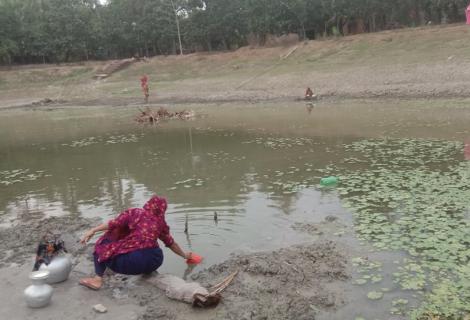Water crisis hits communities in southern Bangladesh

As world leaders gather for President Biden’s virtual climate summit this week, communities in southern Bangladesh – who are facing a severe water crisis – say climate action cannot wait for far-off emission reduction targets.
In the southern coastal districts of Satkhira and Barguna, families are being hit by a prolonged and unusual dry spell, which has affected groundwater supply, leading to increasing levels of salinity and a lack of clean, safe drinking water.
The crisis is putting women and girls most at risk of rising gender-based violence, child marriage and health problems, including cholera and dysentery.
Farah Kabir, country director of ActionAid Bangladesh, says:
“The Biden summit is being billed as an event to encourage countries to set more ambitious climate goals and step-up efforts to tackle the climate crisis.
“But communities in Bangladesh are already being devastated by the climate crisis. They face increasingly frequent and severe cyclones, water shortages, flooding and soil salination.
“The current water crisis sweeping southern regions shows the urgent need for real zero climate pledges that cut greenhouse gas emissions now, not by 2030 or 2050.
“The summit is also an opportunity for developed countries to deliver on their promise of climate finance to support the world’s most vulnerable countries, like Bangladesh, to adapt and recover from the impacts of climate change.”
ActionAid Bangladesh is responding to the humanitarian crisis in the coastal, southern region by providing safe drinking water to 2,000 of the most vulnerable people in Satkhira who cannot afford to buy water.
Due to increased salinity, sources of fresh water like ponds and tube wells are decreasing day by day. People are being forced to drink contaminated water which is leading to an increase in diseases such as diarrhoea, cholera, dysentery, jaundice, skin diseases and sores.
Women and girls, who are traditionally responsible for collecting water for use at home, are bearing the brunt of the crisis.
Dr Mahatab Hossain, a medical officer at Kaligonj Upazila Health Complex, told ActionAid’s local partner that he was treating many women for urinary tract infections and other genital conditions linked to contaminated water.
As a nationwide lockdown in Bangladesh aims to limit the spread of Covid-19 cases, the water crisis means families are struggling to take the hygiene measures needed to protect against the virus.
A woman from Satkhira said: “The price has been doubled for the water available in markets. Our income has been reduced due to the Covid-19 pandemic so we cannot purchase water from market sources. We are forced to use the contaminated water.”
Ends.
For more information and interviews contact Jenna.Pudelek@actionaid.org or call +447795642990.